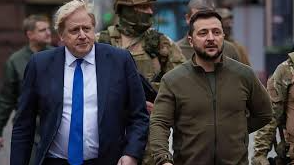Paris Security Summit Seeks Unified European Response as US Shapes Ukraine’s Fate
European leaders are urgently working to assert their influence on Ukraine’s future, gathering at a hastily organised security summit in Paris. This comes after the United States excluded them from pivotal discussions with Russia. US President Donald Trump revealed plans for a potential meeting with Russian President Vladimir Putin, raising concerns in Europe about being sidelined on a critical security issue.
Faced with the challenge of proving their relevance, European nations are attempting to set aside political differences and economic worries to present a united front. They aim to negotiate collective security measures and possibly commit troops to Ukraine, ensuring they have a voice at the diplomatic table.
UK Prime Minister Sir Keir Starmer affirmed on Monday that the UK stands “ready and willing to put troops on the ground”. Similarly, Germany’s CDU party, expected to lead after upcoming elections, indicated its willingness to participate in a coordinated international military effort.
Uncertainty surrounds the Trump administration’s stance on Ukraine, creating a narrow window for Europe to assert its strategic importance. European leaders hope the Paris summit will convince Trump of their indispensable role by addressing two key US demands: increased European defence spending and deploying troops to Ukraine following a ceasefire.
Europe insists on Ukraine’s inclusion in any ceasefire discussions, maintaining the position that “no decisions about Ukraine can be made without Ukraine’s involvement”. Beyond Ukraine, Europe faces the uncomfortable reality that the Trump administration prioritises neither its alliance with European nations nor their security.
Since World War Two, Europe has depended on US military support. But with Trump’s unpredictable foreign policy and Putin’s longstanding opposition to NATO’s eastern expansion, European countries, especially the Baltic states and Poland, feel increasingly vulnerable.
The Paris summit includes military heavyweights: the UK, France, Germany, Italy, Poland, Spain, Denmark (representing Nordic and Baltic nations), the EU Council president, and NATO’s secretary general. Broader meetings with other European countries are planned for a later date.
However, reaching a consensus on increased defence spending will be challenging. For instance, while Poland aims to allocate 4.47% of its GDP to defence by 2025, the UK struggles to meet its 2.5% target. Nevertheless, leaders are expected to pledge better coordination within NATO and take on a significant share of Ukraine’s post-war rebuilding efforts.
A central topic in Paris is the potential deployment of European troops to Ukraine as a “reassurance force” following a ceasefire. Unlike peacekeeping missions, these forces would be stationed behind any ceasefire line to provide strategic support. This presence would serve three purposes: assuring Ukrainians they are not alone, demonstrating Europe’s commitment to its security to the US, and signalling to Russia that Europe stands ready to respond to any ceasefire violations.
Yet, this proposal faces domestic resistance in Europe. In Italy, for example, 50% of the population opposes sending additional weapons to Ukraine, let alone troops. Key questions remain unanswered, including the number of soldiers required, their command structure, and their rules of engagement in case of Russian aggression.
Europe seeks a security guarantee from the US before committing troops but may not receive one. With national leaders like Sir Keir Starmer balancing international obligations and domestic challenges, including budget constraints and military readiness, the path forward is uncertain.
Former British Army Chief Lord Richard Dannatt noted that the UK’s military is too depleted to contribute significantly to a potential 100,000-strong force needed in Ukraine, despite its reputation for excellence.
While the Paris summit is unlikely to yield detailed agreements, it sets the stage for Europe to assert its strategic role. Plans are in place to send an envoy to Washington to reinforce Europe’s position. Sir Keir Starmer’s upcoming visit to Washington could be pivotal in strengthening transatlantic ties.
The summit also provides an opportunity to heal post-Brexit tensions between the UK and the EU. Mark Leonard, head of the European Council on Foreign Relations, highlighted that Starmer could demonstrate the UK’s commitment to European security, which could positively influence future trade and law enforcement negotiations.
Host nation France, under President Emmanuel Macron, is optimistic about Europe’s strategic autonomy. Macron advocates for reduced dependence on external powers for supply chains, technology, and especially defence. His proposal for European troops in Ukraine, first suggested a year ago, is gaining traction.
With the Trump administration questioning Europe’s strategic importance, the outcome of this summit could redefine the continent’s security architecture. If Trump is not watching, Vladimir Putin certainly is.


















